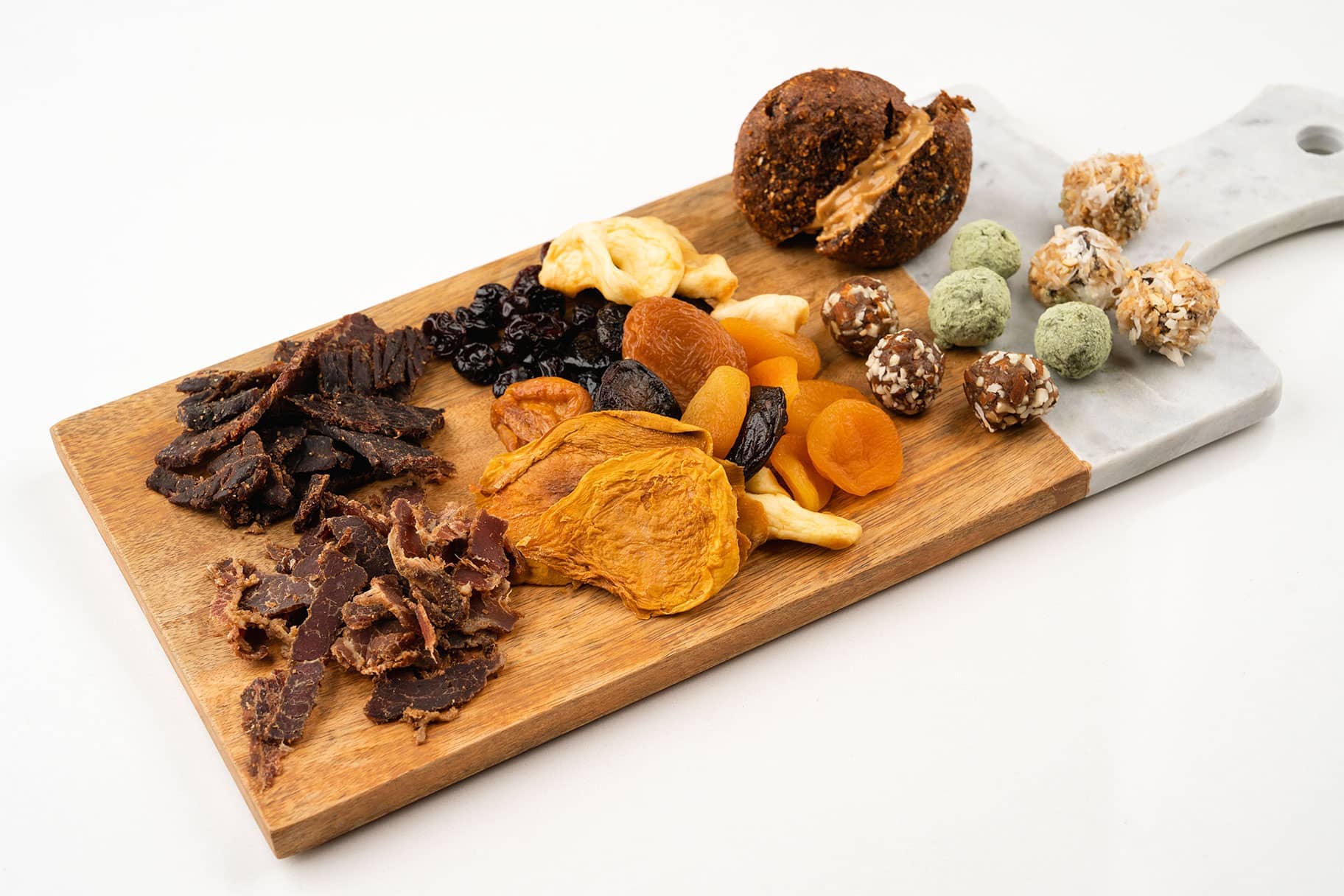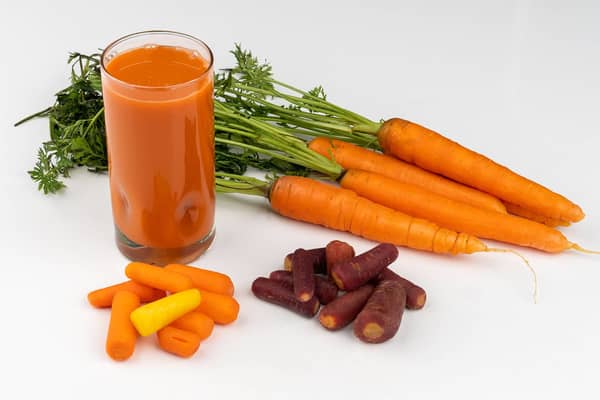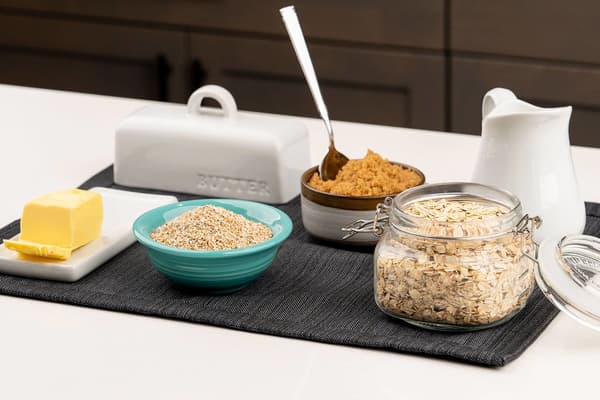4 Snacks To Bring On Your Next Hiking Adventure
Nutrition
See which goodies a registered dietitian recommends you have stashed in your bag while on the trail.

There's something about being out on the trail that makes food taste better. Maybe it's the fresh air and sunshine or the intensity of climbing through mountains and forests, but a snack just hits differently when hiking. Regardless of what type of adventure you're planning, it's always important to have a pack full of nutritious hiking snacks with you.
Hiking is an endurance activity. Like most forms of exercise done for longer than an hour, hiking requires fuel to prevent injury and exhaustion. In fact, it's ideal to consume 30 to 60 grams of carbohydrates per hour during exercises that last longer than one hour, per a 2016 position paper in the Journal of the Academy of Nutrition and Dietetics. That's because the carbohydrates provide benefits by contributing to muscle fuel needs and maintaining stable blood sugar levels.
(Related: Eat These Foods Before Exercising, Says a Registered Dietitian)
During prolonged bouts of exercise, you may need to increase your carbohydrate consumption per hour on the trail, but these needs vary due to a few factors including level of exertion, the distance of the hike and even altitude. That being said, even if a hike is relatively short (one to three miles), if it's going to take more than one hour, be sure to pack snacks to stay energised.
What To Know Before Packing Hiking Snacks
When packing for your next adventure, there are a few things to consider.
- Length and intensity of the hike. To pack the right amount of fuel, be sure to iron out your route. For example, a 90-minute day hike will require a snack that has roughly 30 grams of carbohydrates. A large banana, for instance, has that many carbs.
- Outdoor temperature. Hiking in cold temperatures will keep some perishable foods fresh, whereas warm temperatures will require non-perishable snacks to prevent food spoilage. Avoid foods that are meant to be refrigerated if hiking in temperatures above 4ºC.
- Digestibility. Avoid a stomach ache by packing foods that are easy to digest. This means skipping foods that are high in fibre (or, at least, packing a smaller amount) since fibre takes a while to digest.
- Pack more in case of an emergency. It's critical to have at least one or more hiking snacks in your backpack (whether that be a bag of granola or pretzels) any time you go out into the wilderness.
- Make sure you have hydration options. Having plenty of fluids available in your bag is imperative for a safe hike. For example, pack beverages that are full of electrolytes. Alternatively, sprinkling a little bit of salt into your water can give you a much-needed boost of sodium.
(Related: This Is Exactly How Much Water You Should Drink Every Day, According to Experts)
Hiking Food To Pack on Your Next Journey
1.Jerky and Dried Fruits

Jerky and some dried fruit is a classic choice for a hiking snack. This non-perishable duo requiring zero preparation is a no-brainer for those eager to get to the trailhead.
Dried fruit is a great source of fast-burning carbohydrates due to its high sugar content. Fast-burning carbs provide almost instant energy that will help get you through the last mile or final push up to the summit. But, note that fruits will vary in sugar and carbohydrate content. For example, half a cup of dried apricots contains roughly 40 grams of carbs and the equivalent amount of raisins contains about 57 grams of carbs, so you may find the latter more energising (for a smaller serving).
Enjoying fruit alongside jerky will help you to stay full for a while on your backpacking journey. Consuming adequate protein helps induce satiety and satisfaction, so while the fruit will get you to the end of the trail, the jerky will make sure you're not feeling depleted when you get there.
2.Nut Butter and Berry Sandwiches

A slightly elevated take on the classic peanut butter and jelly sandwich, this snack uses fresh fruit, your preference of nut (or seed) butter, plus your favourite bread. Whether wholemeal, white or gluten-free bread, most standard bread slices contain about 15 grams of carbs.
You'll need two slices of bread, onto which you'll spread the peanut butter and sandwich the gently mashed berries between. This go-to hiking food will keep you energised for about one hour's worth of exercise. Using fresh berries instead of jam lowers the sugar content, which is ideal for those who want a less sugary option. In addition to being tasty, fresh berries are nutrient-dense and a rich source of polyphenols (naturally occurring beneficial compounds found in plants).
Polyphenols have antioxidant properties. What does this mean for those who hike long distances frequently? Consumption of these polyphenol-rich foods might help decrease the natural inflammation associated with the physical stress of exercise.
3.Homemade Energy Bites

Known as energy bites or sometimes called protein balls, these homemade snacks are versatile and can be made to include whatever nutrients you need.
Most recipes start with a few foundational ingredients such as a nut or seed butter, oats and a sweetener like honey, dates or maple syrup. The oats and sweetener cover the carbohydrates needed when hiking. The nut or seed butter counts as both a fat and protein source. For longer, more exhausting hikes, it can be beneficial to add protein powder or hemp seeds (a vegan, wholefoods source of protein) for an extra protein boost.
Flavour your bites with vanilla extract or experiment with other flavour options like ginger or cacao powder. For hikers looking to add an energy boost, ground coffee beans or matcha powder can be used as a source of caffeine. Make a large batch of these before your hike and store them in the fridge or freezer so they are ready to pack whenever you need them.
4.Homemade Power Muffins

Baked goods always make excellent on-the-go snacks for any and all backpacking adventures. However, not all baked goods are created equally.
Many pre-packaged muffins and cookies contain unnecessary added sugar and preservatives. Making your own muffins is relatively easy, and they can be stored in the freezer. Muffin recipes are also so easy to adapt—flours and sweeteners can be chosen based on dietary needs and any add-ons like nuts, seeds or dried fruit can be included based on flavour preferences.
If you're heading out on a full-day hike, it might be wise to add protein powder to your muffin batter, just like with the energy bites. You can also create a "stuffed" muffin by slicing it ahead of time, smearing a nut or seed butter on both halves, putting it back together and tossing it in your bag for a fully loaded snack that includes carbohydrates, fats and proteins.
Words by Sydney Greene, MS, RDN.





